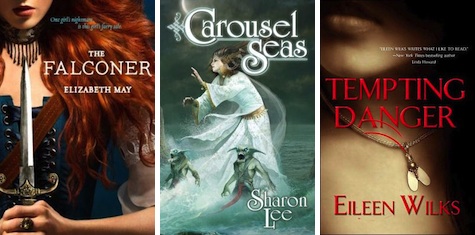Recent weeks have seen me turn to reading novels that I personally categorise as “fluff.” There’s much to be said for books that do predictable things with verve and energy, and much to be said, too, for books that take an utterly ridiculous premise and turn it into a fun read.
Elizabeth May’s The Falconer has just such a ridiculous premise. It is Edinburgh, at some point in a steampunk version history in which ladies wear corsets and go to balls and gentlemen wear cravats and go to Oxford. By day, the protagonist is a gentlewoman and a debutante: by night she kills supernatural creatures—fairies—hunting for the one who murdered her mother, in company with a powerful fairy who has made a vow to hunt his own kind. When she discovers that the barrier that has kept the more powerful of the fairies from preying indiscriminately on humankind is breaking, it’s up to her and a handful of allies to stand against the returning fairy horde—and save not only Edinburgh, but the world.
By all logic and past form, I shouldn’t have enjoyed this book nearly as much as I did. It’s not challenging, or thought-provoking, and it doesn’t interrogate any of the tropes it claims for its own. And yet it succeeds in being both readable and fun.
Sharon Lee’s Carousel Seas (publishing January 6th) doesn’t have nearly so ridiculous a premise, but like The Falconer it refuses to fit neatly inside any subgenre boundary. This is the third—and apparently final, at least for now—instalment in Lee’s Kate Archer books, and like its predecessors, it’s not quite urban fantasy. Instead, it’s informed by—suffused with—a small town feeling: coastal New England, where the problems of the protagonists have as much to do with interpersonal problems and a major employer selling up and pulling out as they do with murder, violence, and the fate of the multiverse. Carousel Seas is a stronger book that the previous volume, Carousel Sun, and provides a satisfying narrative resolution to several dangling threads.
Burn For Me is the latest novel from husband-and-wife writing team Ilona Andrews, and despite the impression given by the US cover art, it’s not really category paranormal romance. In an America where power is in the hands of a few magically-gifted families—“Houses”—our protagonist is a private investigator whose business is mortgaged and whose extended family relies on her as a major breadwinner. When the House that owns her debts requires her to bring in an extremely dangerous individual, she finds herself thrown together—in competition and eventually in co-operation—with another extremely dangerous individual as they work to uncover a mystery and prevent the destruction of downtown Houston, Texas.
I dislike Andrews’ tendency to turn a controlling, manipulative, overpowering man with no respect for boundaries in the role of “love interest,” but that aside, this is a fun, fast-paced story with some interesting quirks.
Damnation by Jean Johnson is the fifth and final instalment in Johnson’s Theirs Not To Reason Why military space opera series. The previous two volumes marked a decline in quality and enjoyability from the opening pair of books in the series: when the main character is a reliable precognitive psychic, it drains much potential tension from the narrative, and Damnation is the culmination of a trend whereby it seems the author was ticking off a set of check-boxes she had to get past. Nothing of the climax felt earned, and the resolution… wasn’t.
Maybe next time.
When I picked up a copy of Eileen Wilks’ Tempting Danger at random, I didn’t expect to like it. But, instead, I ended up rapidly working my way through another four books in the same series: Mortal Danger, Blood Lines, Night Season, and Mortal Sins. (Oh, ebooks, bane of good financial decisions everywhere.) (Oh ebooks, why can’t I afford the rest of this series?) At first blush this looks like your bog-standard urban fantasy crime story with werewolves—but it’s not quite bog-standard: the main female character is a Chinese-American police detective (later a federal officer), with family and connections who have an impact on her life, while the world-building expands from “werewolves and magic, woo!” to “actually we have several dimensions, and travel between them is possible, let’s go have adventures!” to DRAGONS.
DRAGONS. I am pro this sort of thing. I am maybe not very pro werewolf fated romance, but I’m certainly willing to put up with it—and some structural hiccups—in order to read interesting adventures.
What are you folks reading for fun lately?
Liz Bourke is a cranky person who reads books. Her blog. Her Twitter.










